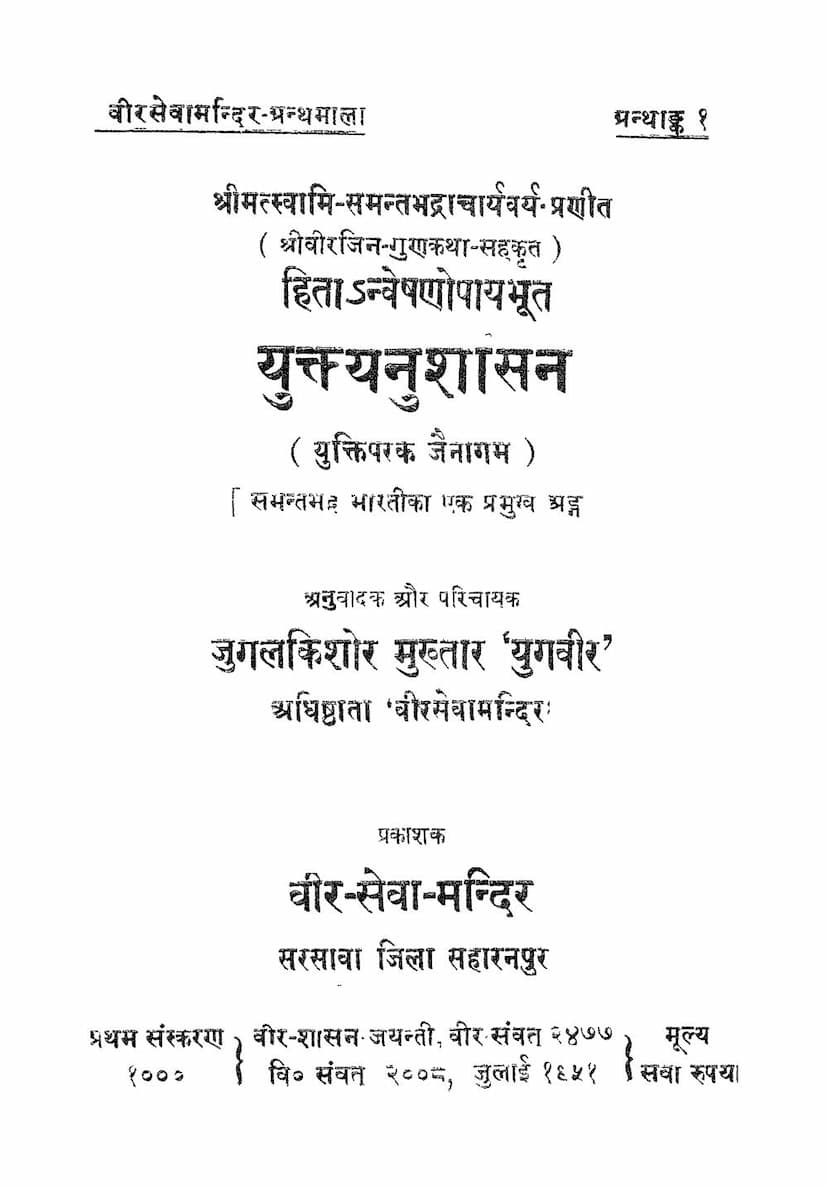Yuktyanushasan
Added to library: September 2, 2025

Summary
Here's a comprehensive summary of the Jain text "Yuktyanushasan" based on the provided pages:
Book Title: Yuktyanushasan ( युक्त्यनुशासन) Author: Jagatguru Swami Samantabhadra Acharya ( जगतगुरु स्वामी समन्तभद्र आचार्य ) Translator and Introducer: Jugalkishor Mukhtar 'Yugveer' ( जुगलकिशोर मुख्तार 'युगवीर' ) Publisher: Veer Seva Mandir Trust ( वीर सेवा मन्दिर ) Catalog Link: https://jainqq.org/explore/010665/1
This substantial Jain text, Yuktyanushasan, is a profound philosophical treatise authored by the revered Jagatguru Swami Samantabhadra Acharya, a pivotal figure in Jainism. The provided pages offer extensive introductory material, including dedications, acknowledgments, publisher's notes, errata, a preface, a detailed introduction to the text and its author, and a table of contents. The core of the text itself, presented with a Hindi translation, is also included.
Core Themes and Content:
-
The Nature of Truth and Reality: The central focus of Yuktyanushasan is the establishment of the Jain perspective on reality, particularly through the lens of Syadvada (relativism) and Anekantavada (non-absolutism). The text meticulously dissects various philosophical viewpoints, refuting absolutist claims and demonstrating how a multi-faceted approach is essential for understanding the true nature of things.
-
Critique of Other Philosophical Schools: A significant portion of the book is dedicated to a critical analysis and refutation of other contemporary philosophical schools, including Buddhism (especially Madhyamika and Yogachara) and Charvaka (materialism). Samantabhadra systematically exposes the logical inconsistencies and limitations of these absolutist doctrines.
-
The Superiority of the Jain Path: Through rigorous logical argumentation (Yukti), Samantabhadra establishes the supremacy of the Jain path, characterized by Syadvada and Anekantavada. This path is presented as the only means to attain true knowledge and liberation, free from the fallacies of one-sided or absolutist views.
-
Praise and Exposition of Lord Mahavir: The Yuktyanushasan is framed as a hymn and a detailed exposition of the teachings of Lord Mahavir. It highlights his omniscient nature, the purity and power of his teachings, and the unique efficacy of his " सर्वोदय" (Sarvodaya - universal upliftment) path.
-
The Role of Syadvada: The text emphasizes that Syadvada, with its use of the word "Syat" (perhaps/in some respect), acknowledges the manifold nature of reality. It highlights that by recognizing different perspectives and context-dependent truths, one can avoid absolutist errors and gain a more comprehensive understanding.
-
Refutation of Materialism (Charvaka): The Yuktyanushasan challenges the materialist view that consciousness is merely a product of the physical elements. Samantabhadra argues against the idea that only material substances exist and that there is no soul or afterlife.
-
Refutation of Momentariness (Buddhism): The text engages in a detailed refutation of the Buddhist doctrine of momentariness ( Kshanikavada). Samantabhadra exposes the logical difficulties in explaining continuity, causality, and identity if reality is solely composed of fleeting moments. The problem of reconciling cause and effect, identity, and the transmission of karma is highlighted as a major flaw in these theories.
-
The Importance of "Yukti" (Reason/Logic): The title itself, Yuktyanushasan, signifies the text's commitment to reasoning. It's presented as an "anushasan" (discipline or rule) guided by "yukti" (logic). The text champions the use of intellect and critical examination to arrive at truth.
-
The Author, Swami Samantabhadra: The introductory sections provide a rich biographical sketch of Swami Samantabhadra. He is portrayed as an exceptionally learned, eloquent, and influential philosopher and poet who mastered various schools of thought before establishing the supremacy of Jainism. His mastery in debate, his vast literary contributions, and his profound spiritual insights are emphasized. He is described as a "Vadi-Ratna" (jewel among debaters) and a "Kavi-Chudamani" (crest jewel among poets).
-
The Structure and Significance of the Text: The table of contents reveals the extensive coverage of the text, including detailed refutations of various absolutist claims, explanations of Syadvada and Anekantavada, and the articulation of the Jain path to liberation. The translator, Jugalkishor Mukhtar, highlights the immense value of this work in making the profound philosophy accessible to Hindi-speaking audiences.
Key Contributions:
The Yuktyanushasan is considered a monumental work for its rigorous logical defense of Jain philosophy. It not only clarifies core Jain doctrines but also serves as a powerful tool for understanding and engaging with opposing philosophical arguments. The text's detailed analysis and systematic refutations make it a cornerstone for those seeking a deep understanding of Jain epistemology and metaphysics. The translation and introduction by Jugalkishor Mukhtar are instrumental in bringing this complex and vital text to a wider readership.